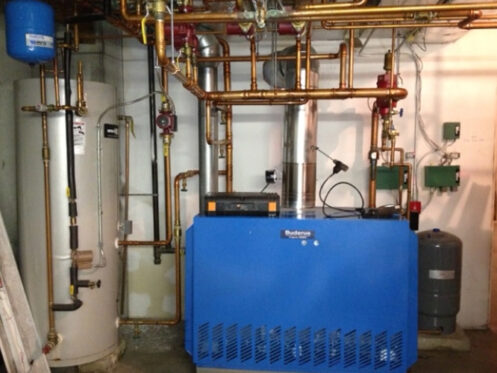When your building’s heating system is due for an upgrade, you’ve got two paths: install a boiler or go with a furnace. While both can heat a commercial space effectively, they work very differently and suit different types of buildings, businesses and usage patterns. At Joyce Cooling & Heating Inc., in Nashua, NH, we help building owners weigh the pros and cons of each, based on what matters most for their space. If you’ve been torn between these options, this guide can help you understand how to make the right choice for your business.
How Each System Heats Your Building
Boilers and furnaces both heat commercial buildings, but they do it in entirely different ways. A furnace uses forced air to move heat through ductwork. It burns fuel or uses electricity to create heat, then a blower pushes (forces) that heated air through vents into your workspaces. That warm air starts circulating pretty quickly after the unit kicks on.
A boiler, on the other hand, uses water. It heats the water inside a tank and sends it through pipes to radiators, baseboards or in-floor heating systems. The heat transfers from the water into the space. The water then cycles back to the boiler to be heated again.
That means the heat from a boiler system tends to feel more consistent and less dry than air pushed from a furnace. If your building relies on ductwork for cooling, though, a furnace can tie into that existing system easily. If it’s all radiant heat already, swapping in another boiler may be the simpler path.
How Installation Can Affect Your Budget
Cost isn’t just about the equipment. The installation process can change the price tag by thousands, especially in older buildings. A furnace installation is usually more straightforward if the building already has ductwork. You may need to just replace the furnace itself and check for leaks or buildup in the vents. If there’s no ductwork in place, though, adding it from scratch can be expensive and disruptive.
Boilers often need less interior disruption. If you already have radiators or baseboards, most of the work happens where the boiler connects to your system. That can make installation simpler, though not always cheaper. The equipment costs more up front, and the labor can be longer, depending on the layout.
The difference in installation cost is something you’ll feel immediately. You can weigh that against how long you’ll stay in the building and see how soon you could expect a return on the investment through savings or reliability.
What To Expect From Energy Efficiency
If you’re hoping to trim your heating bills, both systems have high-efficiency options. Boilers tend to lose less heat during operation, especially if the building holds temperature well. Radiant heat also doesn’t require a fan or blower, so the system uses less electricity.
Furnaces, especially modern high-efficiency models, can also deliver great energy savings. You’ll want to pay attention to the Annual Fuel Utilization Efficiency (AFUE) rating, which measures how much fuel turns into usable heat. The higher the number, the better.
Efficiency also depends on insulation, ceiling height, usage patterns and how airtight your building is. A furnace might feel fast and responsive in a small shop, while a boiler may perform better in a large space where slow, even heat makes more sense.
How Each System Handles Maintenance and Repairs
Boilers and furnaces both require seasonal checks, but the types of maintenance differ. Furnaces need filter changes, vent inspections and blower checks. Filters can clog up quickly in dusty spaces or high-traffic offices. That’s an easy fix, but if ignored, it strains the blower and shortens the system’s life.
Boilers don’t have filters or fans, but they need pressure readings, valve testing and water-level checks. Mineral buildup inside the tank or heat exchanger can cause problems if the water isn’t treated correctly. Leaks might be harder to spot because the system is closed and pressurized.
If your team can handle basic filter swaps and vent checks, a furnace might fit your workflow better. If you’d rather avoid moving air or prefer fewer parts to wear out, a boiler could mean less hands-on time in the long run.
Comfort Levels and Heat Distribution
A furnace fills a space with hot air fast, but that air cools down just as quickly when the system cycles off. That leads to more noticeable temperature swings, especially near doors or drafty windows. The air also tends to dry out during long heating cycles, which can be uncomfortable in winter.
Boilers create a different kind of warmth. Instead of blowing hot air, they warm the surfaces in a room. That radiant heat rises naturally and lingers longer, creating a steadier feel. If you’ve ever walked into a space with heated floors or old-school radiators, you know the difference.
If your team complains about dry air or constant temperature shifts, switching from a furnace to a boiler could help. On the other hand, if you need fast heat for short bursts or want to warm a space quickly between shifts, forced air might be the better match.
Space Constraints and Physical Layout
Commercial spaces vary. Some have utility closets with just enough room for a small furnace. Others have boiler rooms with tanks and piping already present. A furnace usually takes up less space and vents through the roof or an outside wall. If the space is tight or you don’t have a dedicated utility area, a furnace might be the only option.
Boilers need more space, especially if you’re heating with water and not steam. The tank, expansion chamber and piping occupy more space. They also need clearance around the unit for safe operation and easy maintenance.
If your building has mechanical space built into the original plans, a boiler will likely fit. If the heating system feels like an afterthought, or you’re converting an office or retail unit, a compact furnace might be easier to install.
Fuel Source Flexibility
Both systems come in models that run on natural gas, propane, oil or electricity. In areas where natural gas is available, it’s often the most affordable fuel type. If your building is off-grid or outside the gas-line network, propane or oil may be your only choices.
Electric boilers and furnaces are common in places with stable electrical pricing or access to renewable power. While they cost more to operate in most cases, they require less venting and can be easier to service.
If you already use gas for cooking or water heating, adding a gas furnace or boiler may be the smoothest path. If you’re trying to transition away from fossil fuels, a high-efficiency electric unit could be worth the higher operating cost.
Planning for Future Expansion
Think about what the next few years might look like. If your business is growing and you expect to expand your space or increase your heating demands, a system that scales easily can save you trouble. Furnaces are easier to upgrade if your ductwork supports additional zones or larger blowers.
Boilers can be harder to expand without modifying the whole loop. If the system was designed for a smaller area, stretching it to cover new offices or a warehouse might take extensive piping changes.
If your space is stable and not changing anytime soon, either system can work. If you’re planning growth, it helps to talk to someone who can help you choose equipment that leaves room to scale without having to start over.
Schedule Your Heating Consult Today
The heating system you choose sets the tone for comfort, efficiency and maintenance needs for years to come. Whether you’re leaning toward the simplicity of a furnace or the even comfort of a boiler, make sure you’re thinking about how your space is used year-round. At Joyce Cooling & Heating Inc., we install, repair and maintain boiler and furnace systems, and we’d be happy to discuss your options. If you’re ready to stop guessing and start planning, give us a call today.


